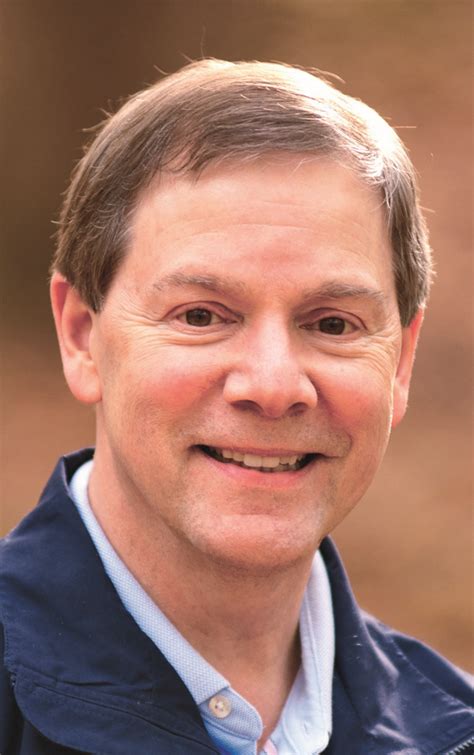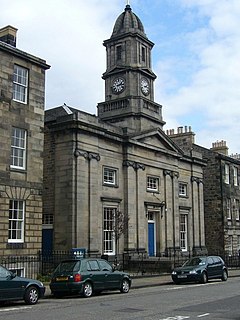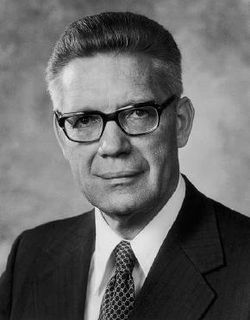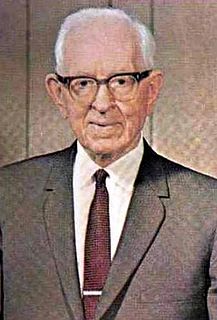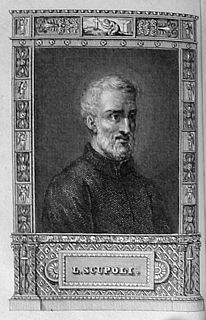A Quote by Joseph B. Wirthlin
God truly is our Father, the Father of the spirits of all mankind. We are his literal offspring and are formed in his image. We have inherited divine characteristics from him.
Related Quotes
To Whom does our God say, 'in our image' (Gen. 1:26), to whom if it is not to Him who is 'the brightness of His glory and the express image of His Person' (Heb. 1:3), 'the image of the invisible God' (Col. 1:15)? It is then to His living image, to Him Who has said 'I and My Father are one' (Jn. 10:30), 'He who has seen Me has seen the Father' (Jn. 14:9), that God says, 'Let us make man in our image'.
Jesus is the prime exemplar of life in God's presence. He lived out of an awareness of the identity God had given him, not the identity the world wanted to give him; he led an active, ongoing prayer life; he took time apart from the world to be with his Father; he made his Father's agenda his agenda; he made his Father's love for people evident in tangible ways; and so on. These are all characteristics that we should emulate in our lives.
The psychoanalysis of individual human beings, however, teaches us with quite special insistence that the god of each of them is formed in the likeness of his father, that his personal relation to God depends on his relation to his father in the flesh and oscillates and changes along with that relation, and that at bottom God is nothing other than an exalted father.
God never gives dominion to any creature which has not received his image. His image is love. Other things belong to God; but God is love. No creature that has not love will be allowed to have a permanent empire. The Father of mercy will not put the reigns of government into a hand that has no heart. Dominion is a very solemn thing; it may oppress, crush, destroy. The Father must have a guarantee for its gentleness. What guarantee can there be but his image - the possession of a nature tender as the Divine?
As far as this life is concerned, [Jesus] was born of Mary and of Elohim; he came here as an offspring of that Holy Man who is literally our Father in heaven. He was born in mortality in the literal and full sense as the Son of God. He is the Son of his father in the same sense that all morals are the sons and daughters of their fathers.
There is no God separate from you, no God higher than you, the real "you." All the gods are little beings to you, all the ideas of God and Father in heaven are but your own reflection. God Himself is your image. “God created man after His own image." That is wrong. Man creates God after his own image. That is right. Throughout the universe we are creating gods after our own image. We create the god and fall down at his feet and worship him; and when this dream comes, we love it !
There were certain great principles involved in the organization of this earth, and one was that there might be a place provided whereon the children of our Heavenly Father could live and propagate their species and have bodies formed for the spirits to inhabit who were the children of God; for . . . He is the God and Father of the spirits of all flesh.
'Go to My brethren, and say unto them, I ascend unto My Father, and your Father, and to My God, and your God' (Jn. 20:!7). He is our Father by grace through the Spirit of adoption (Rom. 8:15), but His Father by nature on account of His divinity. Similarly, He is our God as the creator of our human nature, but His God by reason of the dispensation whereby He became man. He made these distinctions so that we might understand the difference.
The natural inclination of man is to rely solely upon himself and to ignore the purpose of his existence as well as his relationship to God who is his spiritual father. If man will recognize his divine origin, he will then realize his Heavenly Father will not leave him alone to grope in darkness of mind and spirit, but will make available a power to influence him in right paths and into standards of good behavior. The Holy Ghost is that power.
The idea that the Lord our God is not a personage of tabernacle is entirely a mistaken notion. He was once a man. Brother Kimball quoted a saying of Joseph the Prophet, that he would not worship a God who had not a Father; and I do not know that he would if be had not a mother; the one would be as absurd as the other. If he had a Father, he was made in his likeness. And if he is our Father we are made after his image and likeness.
We do not worship the Prophet. We worship God our Eternal Father and the risen Lord Jesus Christ. But we acknowledge the Prophet; we proclaim him; we respect him; we reverence him as an instrument in the hands of the Almighty in restoring to the earth the ancient truths of the divine gospel, together with the priesthood through which the authority of God is exercised in the affairs of His Church and for the blessing of His people.
When the father dies, he writes, the son becomes his own father and his own son. He looks at is son and sees himself in the face of the boy. He imagines what the boy sees when he looks at him and finds himself becoming his own father. Inexplicably, he is moved by this. It is not just the sight of the boy that moves him, not even the thought of standing inside his father, but what he sees in the boy of his own vanished past. It is a nostalgia for his own life that he feels, perhaps, a memory of his own boyhood as a son to his father.
Total surrender to the will of God actually is sacrificing oneself as a burnt offering to God. The proof of this state is dying to oneself, - to one's own opinions, wishes and feelings or tastes, in order to live by Divine intellect, in conformity with the Divine will and in partaking of God. In the forefront of this endeavor is our Lord and Savior. He surrendered the whole of Himself to God the Father, and us in Himself, 'For we are members of His body, of His flesh, and of His bones' (Eph. 5:30). So let us hasten in His footsteps?
I know that God is our Father. He introduced His Son, Jesus Christ, to Joseph Smith. I declare to you that I know that Jesus is the Christ. I know that He lives. He was born in the meridian of time. He taught His gospel and was tried. He suffered and was crucified and resurrected on the third day. He, like His Father, has a body of flesh and bone. He made His Atonement. Of Him I bear witness. Of Him I am a witness.


